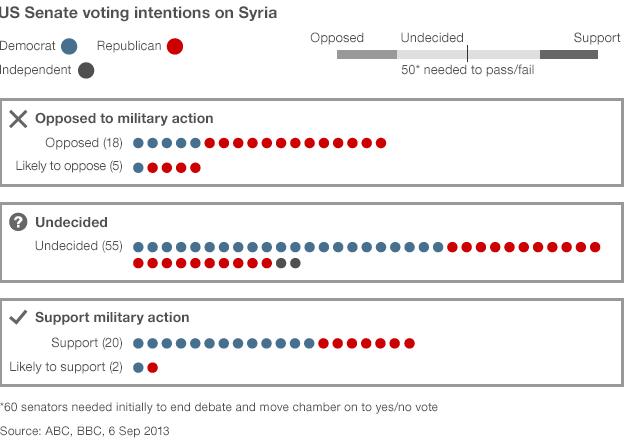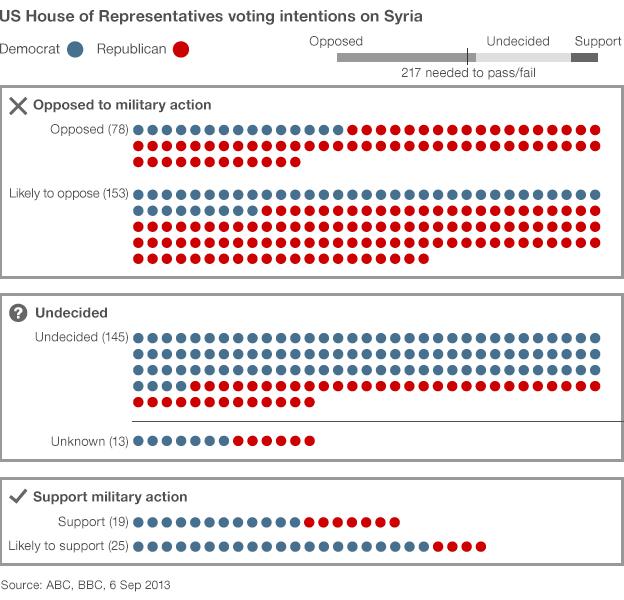Bashar al-Assad: US will pay price for Syria strike
- Published
The BBC's Jeremy Bowen: "Sometimes Damascus doesn't look like a wartime city. But all this is an illusion of normality"
Syrian President Bashar al-Assad has warned that the US will "pay the price" for any strike against Syria.
He told US broadcaster PBS that strikes would increase instability and lead to the spread of terrorism in the region.
He said there was "no evidence" that government forces had used chemical weapons against their own people.
Meanwhile, US Secretary of State John Kerry has once again warned that taking no action against Mr Assad's regime is riskier than launching strikes.
When asked at a news conference whether there was anything Mr Assad could do to avoid military action, Mr Kerry replied that he could hand over his entire stockpile of chemical weapons within the next week.
US officials later clarified that Mr Kerry was making a "rhetorical argument" rather than a serious offer.
However, Russian Foreign Minister Sergei Lavrov said that Moscow had urged Syria to put its chemical weapons under "international control" to help avoid military strikes.
He said the offer was made during talks with the Syrian foreign minister, and he hoped for a quick response from Damascus.
'Expect everything'
Mr Kerry has been lobbying hard for military action against Syria during talks with EU and Arab foreign ministers in Europe.
The US Congress is due to debate this week President Barack Obama's resolution to launch a "limited, narrow" strike.
The US accuses Mr Assad's forces of killing 1,429 people in a poison-gas attack on 21 August on the outskirts of the capital, Damascus.
Mr Assad's government blames the attack on rebels fighting to overthrow him in the country's two-and-a-half-year civil war, which has claimed some 100,000 lives, according to UN estimates.
John Kerry: "The risk of not acting is greater than the risk of acting"
In his interview with PBS, the Syrian president said the Middle East was "on the brink of explosion".
"You're going to pay the price if you're not wise with dealing with terrorists. There are going to be repercussions," he said.
"You should expect everything. The government is not the only player in this region. You have different parties, different factions, different ideologies. You have everything in this decision now."
Mr Assad did not explain whether his comment was a threat that Syrian-backed groups such as Hezbollah would launch retaliation, or a warning that strikes would bolster al-Qaeda-linked groups.
Mr Assad calls the rebels "terrorists" and has often insisted that they are linked to al-Qaeda.
In the PBS interview, he once again denied using chemical weapons.
The White House immediately dismissed his statement.
"It doesn't surprise us that someone who would kill thousands of his own people, including hundreds of children with poison gas, would also lie about it," said spokeswoman Bernadette Meehan.
And UK Foreign Secretary William Hague said the world must not "fall into the trap" of giving Mr Assad any credibility.
'Heavy lift'
The White House has admitted it has no "irrefutable" evidence of Mr Assad's involvement in the August attack.
But a spokesman said on Sunday a "strong common-sense test irrespective of the intelligence" suggested his government was responsible.
Mr Obama has cleared his schedule this week to focus all his attention on building support for the Syrian intervention.
He has acknowledged he faces a "heavy lift" to win congressional backing.
While the government believes it has backing in the Senate, the passage of the Syria resolution in the Republican-led House of Representatives is likely to be much harder.
A poll carried out by ABC and the BBC on Friday suggested more than 230 of the 433 representatives were either opposed or likely to oppose strikes.
Just 44 representatives said they would support or were likely to support action, and a large proportion are still undecided on the issue.
Many US politicians remain concerned that military action could draw the nation into a prolonged war and spark broader hostilities in the region.
An opinion poll of 1,000 Americans carried out for CNN suggested 55% would oppose military strikes even if Congress passed the motion. Some 43% said they were in favour.
Should Congress reject the motion, the proportion against military strikes rises to 71% compared with 27% who said they would still favour action.
Outside the US, France supports military intervention but it wants to wait for a report by UN weapons experts before taking action.
Russia and China, which have refused to agree to a UN Security Council resolution against Syria, insist any military action without the UN would be illegal.

